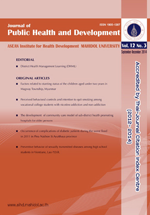Prevalence and associated factors of non-uptake of human immunodeficiency virus testing of tuberculosis patients in Thailand
Main Article Content
Abstract
The aim of this study is to assess the prevalence and associated factors ofnon-uptake of human immunodeficiency virus (HIV) testing by tuberculosis hospital patients in Thailand. In 2014, a cross-sectional survey was conducted amongst 425 TB patients across 42 hospitals, two province, in all four regions in Thailand. All new TB and new retreatment patients were consecutively interviewed within one month of anti-tuberculosis treatment. The outcome was self-reported HIV testing after TB diagnosis, validated using clinic registers. Results indicate that 38.4% of the 425 participants had not undergone HIV testing. Multivariate analysis found 61 years and older and being a migrant worker was significantly associated with associated with “Not tested for HIV”, while other socio-demographic factors, geolocality, TB diagnosis characteristics, TB treatment status, TB knowledge substance use and TB-AIDS stigma were not significantly associated with associated with “Not tested for HIV”. In conclusion, the level of HIV testing among TB hospital patients was suboptimal, and the Ministry of Public Health should continue to scale-up HIV testing and other collaborative TB-HIV services at health facilities.






